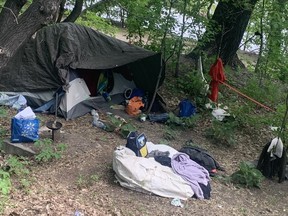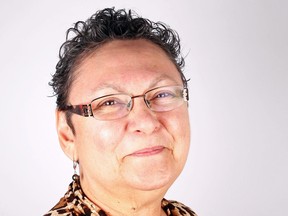“It’s now at the point where we can’t even seem to bring anything under control. It’s really very desperate.”

Article content
Winnipeg’s homeless problem is out of control, says the executive director of a prominent outreach organization — while the mayor says taxpayers aren’t getting value for their money when it comes to managing the crisis.
Advertisement 2
Story continues below
Article content
There are currently between 1,500 to 2,000 encampment residents in Winnipeg, said Marion Willis of St. Boniface Street Links. She estimates there are less than 5,000 people experiencing various kinds of homelessness across the city.
There were around 1,256 people in various homeless situations in Winnipeg during the month of May 2022, according to End Homelessness Winnipeg (EHW) survey. The current estimate is 3,038 people.
“We are dealing with a level of social distress unlike anything I have seen in my 40-year career, and we don’t have the resources to address these things,” said Willis, who thinks the City and province are running low on funds to cover social programs.
“We are now living through this post-pandemic period, as though the pandemic ended and we are all just getting back to life as it was. There is no life as it was.”
Advertisement 3
Story continues below
Article content
The Canada-wide drug crisis is making the homeless problem much worse, said Willis, adding the federal Indigenous Reaching Home program only engages an estimated 30% of homeless people in Winnipeg. The rest are “in survival mode,” she said.

Reaching Home offers housing and wraparound services to people facing multiple barriers, including a history of homelessness and mental illness.
Drug overdoses, property crime, violent crime and the homicide rate can all be connected to the 70% of people who are in survival mode, said Willis, noting a successful plan to tackle the drug crisis would keep many people from falling into homelessness.
According to Statistics Canada, Winnipeg’s crime severity index rose 20% from 2021-2022. Winnipeg Police Service data shows a 31.4% increase in violent crime over a five-year average. Firearm use, knife crime and general weapons use are up.
Article content
Advertisement 4
Story continues below
Article content
St. Boniface Street Links and other Winnipeg homeless agencies are doubling down on the Housing First model to get people off the street. The concept is simple — housed people are more effectively helped than people sleeping in back alleys or encampments, said Willis.
Out of control
Coordinating a response between agencies and government is critical to optimize financial resources, said Willis, adding she doesn’t think a law-and-order approach, building more jails for criminals, is the answer.
“There’s no stomach for that among politicians,” she said, noting many “normal” people spiralled into addiction and homelessness during the pandemic. “It’s now at the point where we can’t even seem to bring anything under control. It’s really very desperate.”
Advertisement 5
Story continues below
Article content
As part of the 2024-25 fiscal year, the province is spending $26.7 million to fund 11 organizations in Winnipeg for programs including emergency shelters, transitional housing, casework, and support services, said a provincial spokesperson.
The City, according to the mayor, has budgeted over $50 million this year to support the province with various programs to help the homeless.
Willis said there is now a strong desire for the City and province to work together. Winnipeg Mayor Scott Gillingham and delegates from the province travelled to Houston, Texas, to learn about that city’s success with a low-barrier housing first model.
During the past 13 years, Houston, population 2.3 million, has lowered its homeless population by around 64% using the model, says community organization SEARCH.
Advertisement 6
Story continues below
Article content
Ottawa, the Province and City need to transform the Reaching Home program, said Willis. People outside a very specific demographic and set of circumstances should be included to broaden the program.
“There’s lots of discussion and a real willingness by the new NDP provincial government and Mayor Gillingham and council to move forward and launch a new approach similar to the Houston model,” said Willis. “The mayor wants us all in the same boat all rowing in the same direction (but) the greatest challenge of all is who is going to fund it?”

Progress is being made, but not fast enough for residents or those suffering on the street, said Gillingham, adding Premier Wab Kinew is making the issue a priority.
“Issues like homelessness, addiction, mental health and poverty are traditionally the jurisdiction of the provincial government,” said Gillingham. “But we as a city, by necessity, have had to step in to try to help.”
Advertisement 7
Story continues below
Article content
Money currently spent on housing is being used to prop up the existing strategy in Manitoba that provides help to around 30% of people lucky enough to qualify, said Willis.
“We need to come up with a strategy to end homelessness that leaves no one behind,” she said.
St. Boniface Street Links has been using a modified Houston model for six years. Over a 36-month period, Willis and her team housed 986 people out of encampments, transit shelters, and other spaces.
“The proof is in our outcome,” she said, noting other outreach teams in the city deserve credit for their efforts.
A lack of service delivery coordination works against the problem, said Gillingham.
“When groups like the Downtown Community Safety Partnership, or our paramedics, continue to respond to the same individuals over and over and over again, what we are doing for that individual is not working,” he said, noting low-level drug dealers are poisoning vulnerable people in a cross-Canada problem.
Advertisement 8
Story continues below
Article content
“And you know, yes, taxpayers might not be getting value for their money, but more importantly, the individual who is struggling is not getting the services they need.”
Many homeless people who fall into crime are not oriented to living by the rules of society, said Coun. Ross Eadie (Mynarski).
“You can call for all the solutions you want for people who are struggling, but it’s not going to get better until they – they – make a move to get better.”
The Alberta strategy
The Government of Alberta has taken aggressive action to remove many homeless encampments in Edmonton and Calgary and to direct people to appropriate services, said Minister of Seniors, Community and Social Services Jason Nixon, who noted encampments are harbingers of gang activity, exploitation, abuse, violent crime and death from exposure.
Advertisement 9
Story continues below
Article content
Alberta is spending $210 million this budget year on helping the homeless, not including housing.
“What we did was create what we call a Navigation Center here in our province, which really gives a place for people in those circumstances to go to that has wraparound services all across government — that is now working with thousands of people to get them access to more appropriate services than a cold tent,” said Nixon, noting there are special services for women.
“We have the most shelter space in the history of our province. We moved to 24-hour-a-day, seven-day-a-week shelter spaces so that we weren’t seeing spots where people were being pushed out to the streets to impact business owners. Instead, they had a place to be, even during the day.”
Advertisement 10
Story continues below
Article content
More than 3,500 people in the last eight or nine months have accessed “life-changing” services in the Edmonton Navigation Center, said Nixon. About 3,000 pieces of ID were issued to at-risk people. Another 1,850 people were directed to housing or shelter. Over 95% of those people remain housed, he said. Unlike Winnipeg, all services are coordinated in one location.
“Anybody who is presenting (encampments) as an option is not really looking at the facts of what’s taking place in those encampments,” said Nixon. “Anybody thinking that putting somebody in our cold Canadian winters inside a tent with propane heaters is an appropriate level or safe level of housing needs to give their head a shake. I mean, that’s why we were seeing people burn to death.”
Advertisement 11
Story continues below
Article content
Need to fill the gaps
Winnipeg’s housing shortage, with an estimated 1.8% vacancy rate, is contributing to homelessness, said officials with EHW, noting landlords may hesitate about renting apartments to at-risk individuals. People are also being evicted through apartment renovations, they said.
Average rent for a one-bedroom apartment in Winnipeg is around $1,360 per month according to online rental sources.
“Unless we get down really into systemic change, and really start looking at the policies and procedures and the gaps of what’s going on, we can’t solve the problem, right?” said Betty Edel, senior director at EHW.
More seniors are becoming homeless due to rising rents, said Edel. Also, young people continue to be aged-out of foster care and end up on the street.
Advertisement 12
Story continues below
Article content
Rather than blaming the drug crisis for rising homelessness, Edel examines the level of trauma among at-risk people.

“If you weren’t traumatized before you were homeless, you’re certainly traumatized by being homeless,” she said, noting many homeless people, living in desperation, use drugs as medicine.
“It helps them function in this situation that is not normal for any human being.”
As for the housing first model, it has been used in Winnipeg for years with an Indigenous worldview, said Edel, adding most of Winnipeg’s homeless are Indigenous.
“It’s not only the person who’s standing in front of you what’s going on,” she said. “You need to understand the generations of the people that this person is connected to.”
Advertisement 13
Story continues below
Article content
Edel said housing first isn’t the only model available. Rapid rehousing — a subset of housing first that involves minimizing the amount of time people spend on the street — also needs to be used. There must be continuous support, she said.
“There’s a recent study done where they figured 70% to 90% of the people who are houseless have acquired brain injury,” she added. “We need to be open to a lot of different options.”
More intergovernmental and interagency discussion is happening now than ever before, said Edel.
EHW is creating a community-sector roundtable for the homeless sector to fortify current efforts. The group will examine gaps and redundancy in service delivery, said Jackie Hunt, senior director of strategy and impact with EHW.
Advertisement 14
Story continues below
Article content
“So, we have a champion from the shelter sector to come and sit at this table,” she said. “Everything they learn around that table they can take back to the other shelters and vice-versa so that there’s a better flow of communication.”
Edel wants accountable, honest and difficult conversations about homelessness. The sector needs to admit what isn’t working and what is working, she said, adding there’s no use for defensiveness among agencies.
“If we don’t actually talk about the truth of what’s going on, there is no solution that we come up with that will work,” she said.
“We did a service delivery Expo (on Sept. 13), and it brought together 70 service providers, 120 volunteers and thousands of community members,” said Hunt.
Have thoughts on what’s going on in Winnipeg, Manitoba, Canada or across the world? Send us a letter to the editor at wpgsun.letters@kleinmedia.ca
Article content
Comments